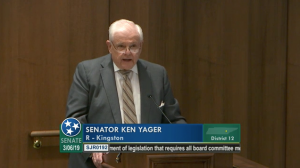Tennessee lawmakers consider support for requiring TVA to hold open meetings
Tennessee state lawmakers are considering a resolution to express support for a bill in Congress that would require TVA’s Board of Directors to hold open meetings.

State Sen. Ken Yager of Kingston is asking for a Senate resolution to support a bill in Congress to require TVA to hold open meetings that the public can attend.
State Sen. Ken Yager, R-Kingston, explained Senate Joint Resolution 192 in a Senate committee meeting this week, in which the resolution won unanimous approval.
“We all know, Mr. Chairman, that the TVA is the steward of billions of dollars of ratepayers money,” Yager told members of the Energy, Agriculture and Natural Resources Committee this week. “ But they also make rules that govern the lives and affect the lives of everybody else in Tennessee. Not the least of which is the property owners of this state.”
“I just think in the spirit of transparency and open government, that all of their meetings should be open,” Yager said.
The Tennessee Valley Authority Transparency Act is sponsored by U.S. Rep Tim Burchett, R-Knoxville and co-sponsored by U.S. Rep. Steve Cohen, D-Memphis.
TVA would be required to hold open meetings, provide minutes
Burchett’s bill would require the board and subcommittees of the board to hold their meetings in public, provide public notice of its meetings no fewer than six days before the meeting, and make publicly available the minutes and summaries of its meetings.
Private meetings could be held with a national security exception, and emergency meetings could be held without the six-day notice.
The current law governing the board of the Tennessee Valley Authority, which was created by Congress in 1933, requires it to have four meetings a year. But there is no provision requiring that all meetings be open to the public, nor that minutes of all meetings be publicly available.
The TVA Board chooses which meetings it allows the public to attend as well as whether it will provide any minutes or summaries of meetings to the public.
“I couldn’t agree more with what he’s trying to do,” Yager said of Burchett.
Though it wasn’t mentioned in the Senate hearing, Yager’s hometown of Kingston was the site of a massive TVA coal ash spill in 2008 that damaged property and waterways. The cleanup has cost millions of dollars, and sickened workers who have come in contact with the toxic sludge. Some workers have died from their illnesses.




